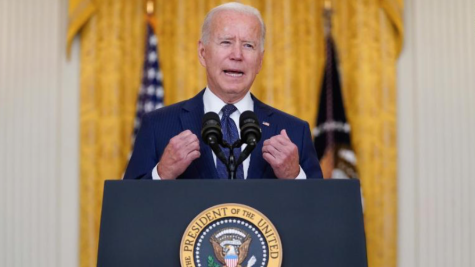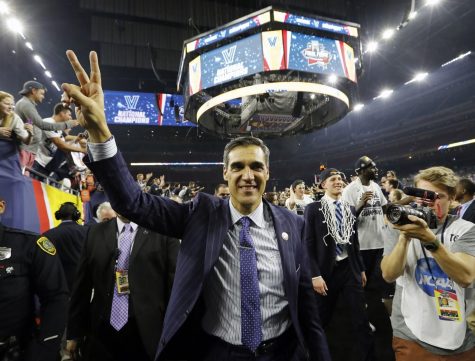Donda Proves Record Labels are Bad for Music
West claims his 10th album “Donda” was released without his approval.
September 8, 2021
On the early morning of Aug. 29, Kanye West finally dropped “Donda,” an album that he teased to release in July 2020. This came after numerous listening parties sprinkled throughout the summer with no concrete release date in sight. This seemingly random time to deliver an album was a surprise to everyone, even to West.
Later that day, West dramatically took to Instagram with a statement, exclaiming that Universal Music Group, the parent company to his record label, released “Donda” without his approval. This made more sense, as he seemingly had no intention to release the album anytime soon for the sake of more listening parties. Luckily for West, his album was basically finished upon its surprise drop. But, this behavior from a record label could be incredibly damaging and shows their exploitative nature towards artists that is commonplace within the music industry.
Record labels make it impossible for artists to have any control early in their careers, often making them owe money until they become popular. Prince was an artist greatly opposed to record labels, making many comments over his career portraying his disdain towards his contract with Warner Bros. He compared modern day record label signings to indentured servitude, in which artists have little to no control over their music or how it is packaged, as per Rolling Stone.
Releasing a smaller artist’s music without their approval could tank its sales due to the high possibility of an unfinished album, putting them further in the debt they owe to the label for using their equipment. This debt follows artists throughout their entire careers until they make it big and start to pay it off. However, this does not necessarily mean they make a profit, as it may take several successful releases to overcome the huge debt they put themselves in. As a result, many artists are pressured to create album after album, often producing strings of rushed and poorly constructed projects that struggle to make sales.
This vicious cycle was notoriously seen with Young Thug. In 2014, the artist ran into issues with his label at the time, 1017 Records, and wanted out. However, he was trapped into a legal agreement, as he originally did not understand the conditions of his contract, as per Buzzfeed. Owning much of Young Thug’s revenue, his label figuratively milked the artist until his contract expired later that year. As a result, Young Thug released five subpar albums in an eight month period. This hurt the artist’s reputation during that time, but thankfully, he got out of that company and became more successful, never replicating that obscene amount of production since.
The main goal for record labels is to manipulate artists into making them the most money possible, while barely providing basic needs. Sadly this extends even to death, as labels tend to release terrible post-mortem albums containing unfinished music the artists produced before death. In very few cases, some of these albums are well-received, such as Pop Smoke’s “Shoot for the Stars Aim for the Moon,” but that album was basically finished before he died. His next album did worse, with many of the songs sounding unfinished with features from other artists trying to hide this fact. This second album did not need to be released, but the record label had no remorse for a deceased rapper’s reputation.
Even worse was the case of XXXTentacion, in which after his death in 2018, his record label released three new albums and a deluxe album for “?,”, which included 94 songs across all four pieces, all released within one year. Many of these songs are almost entirely composed of other artists with XXXTentacion barely featured in them, or they are instrumentals of already released songs and random studio sessions that the label happened to record. The most egregious of these examples is the “song” titled “Jah on drums,” which features XXXTentacion playing drums for 59 seconds.
If the label wanted to commemorate XXXTentacion, that would be fine. The issue with this is the money they received for the streams that these additional songs produced, showing a clear motive. None of his post-mortem albums were well-received, and many people saw through the label’s guise. His label saw an opportunity to make loads of money from a dead artist and seized it, disregarding what it could have meant for his image after his death.
Simply put, record labels are bad for music. They exploit artists for money, practically forcing them to make bad music in order to make up debt, and even after death they find ways to tarnish the legacy these artists left behind. With record labels increasing in revenue by the year, as per Music Business Worldwide, this manipulation seems to have no end in sight.











